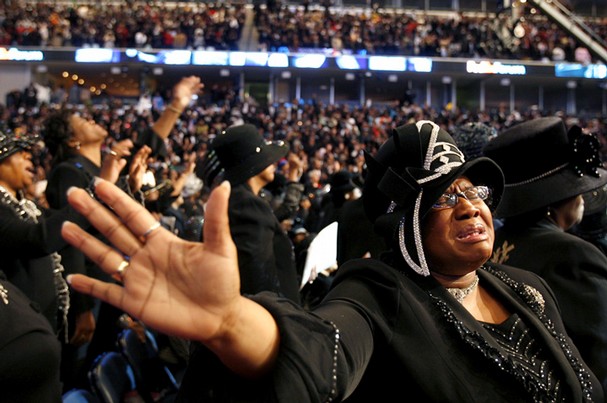Reading Time: 5 minutes
I want to preface my comments by saying that when I use the term “Black church”, please understand that I apply it strictly in terms of the collective of Christian churches across America, regardless of denomination, whose memberships have traditionally and historically been composed primarily of black or, if you prefer, African-American, congregants.
Now, having said that, let me say that I have spent literally half my life in the “Black church” and half my life in the “white church” (a term I employ in a similar context as the aforementioned.) I am equally comfortable in either environment, as I attend church solely on the basis of whether sound biblical theology is taught, not on whether the people who attend there happen to look like me.
I’ve been a member at my current local church since 2009. It is a “white church” whose existence dates back to 1823 – forty years before the Emancipation Proclamation – but is still today, in September 2014, approximately 99.8 percent white.
I do not mention that statistic as a criticism as I am not in any sense a proponent of diversity for diversity’s sake. Not even where the church is concerned. The Holy Spirit will draw to Him those whom He desires (John 6:44.) As such, the racial or ethnic composition of a particular church congregation is none of my concern. I bring up the aforementioned data point only to say that such a statistic does not bother me because, as I said before, I attend church for the theology not the diversity.
That said, however, lately (as in over the past 12-18 months) I’ve found myself burdened for the Black church in a way I have not been before. I know the Black church like the back of my hand. I grew up in it and, as such, have an affinity and appreciation for its traditions, its history and its current-day struggles, many of which are self-induced (e.g. racism within the Black church.)
But what is more disheartening to me than almost anything else is the lack of biblically-sound preaching coming from the pulpits of Black churches today.
It is practically non-existent.
If there was no Bible, it would be no matter whether you could read or not. Reading other books would do you no good.
– Jupiter Hammon
The proliferation of social ideologies such as the black liberation theology of James Cone, combined with the so-called “prosperity gospel” of celebrity pastors like Joel Osteen and others like him, has so deeply infiltrated and influenced the Black church – and its members – that doctrinally-sound biblical preaching has been replaced with a more emotive and relational “gospel” that promotes one’s own subjective spiritual experience, as opposed to the objective Word of God, as absolute truth.
As a result, the Black church has become so doctrinally weak that it is taboo to point out black pastors and preachers, even if what they are teaching is false, because they are so wildly popular among black churchgoers that to do so is to risk being labeled judgmental or, in contemporary parlance, a “hater.” People like TD Jakes, Creflo Dollar and Eddie Long come to mind, just to name a few. (If only names like Jupiter Hammon, Daniel Alexander Payne and Lemuel Haynes were as well-known in Black churches today.)
But not only that, seldom, if ever, will you hear a pastor of a Black church speak to a congregation in purely theological terms on such subjects such as sin, justification, sanctification, the Atonement or the Doctrines of Grace.
He (or “She” depending on the church) may very well mention those terms in the course of delivering the message, however, touching on them in an expositional or systematic manner is a veritably foreign concept in most Black churches in America, as the majority of congregants prefer sermons that make them “feel the Spirit” as opposed to exposing themselves to what many would consider to be boring and unnecessary theological messages that don’t “move” them.
Conversely, biblical preaching has also taken a back seat to styles of worship and music in most black churches. In many Black churches, particularly Black mega churches, it can be difficult to discern whether you’re in a house of worship or a night club.
It’s all about what I sense experientially not what I learn theologically.
Like the majority of those who stand in their pulpits, Black churches today place an incredible amount of emphasis on ensuring the music and worship styles offered are such that “move” their people or gives its members “something to shout about”, which is important because, otherwise, its membership rolls and, God forbid, its tithes and offerings, would dwindle precipitously as more and more congregants define the purpose and mission of their local church in terms of whether the aesthetics of the worship service (i.e. preaching and music style) meet with their personal experiential expectations and preferences.
All too often within the Black church today, the “Amazing Grace” which converted former slave trader John Newton has been replaced with the “Cheap Grace” about which German theologian Dietrich Bonhoeffer warned in his excellent book ‘The Cost of Discipleship‘.
Apart from the Gospel of Jesus Christ, the existence of the Black church – or any Bible-based church for that matter – is entirely pointless. The very first sermon Jesus preached was to exhort the people to “…repent and believe the Gospel” (Mark 1:15).
The Black church must redeem this message.
It must redeem the Gospel.
To that end, theologian Thabiti Anyabwile, in his book ‘The Decline of African-American Theology: From Biblical Faith to Cultural Captivity‘, encourages,
“We must return to making the biblical gospel the foundation for our Christian fellowship and our social ethics. The gospel holds that man is ruined in sin, estranged from God and in profound danger of eternal torment and condemnation in hell. But, God, who made man in His own image for eternal fellowship with Him, has acted in history to redeem man from sin and His wrath to come. God the Father sent God the Son to live the perfect life of worship and obedience to God that we could not and would not live. Jesus volunteered to both live that life and to pay the penalty of death that we owed for our sin. He suffered on Calvary’s cross, died a criminal’s death as a substitutionary propitiation and atonement for our sin. Three days later, He was raised from the dead victorious over sin, death and the grave. Now, all who repent of their sins and believe on Jesus will be saved from the just penalty of their sins, justified before God and given a new life with God. This is the message of Christianity; the message that should dominate all Christian preaching.“
That, my black brothers and sisters, is the Gospel; and the preaching of the Gospel is what the Black Church must be about!
Amen.
“…but these have been written so that you may believe that Jesus is the Christ, the Son of God, and that believing you may have life in His name.” – John 20:31 (NASB)
In His service,
Darrell

